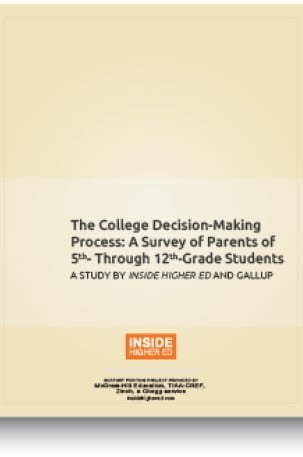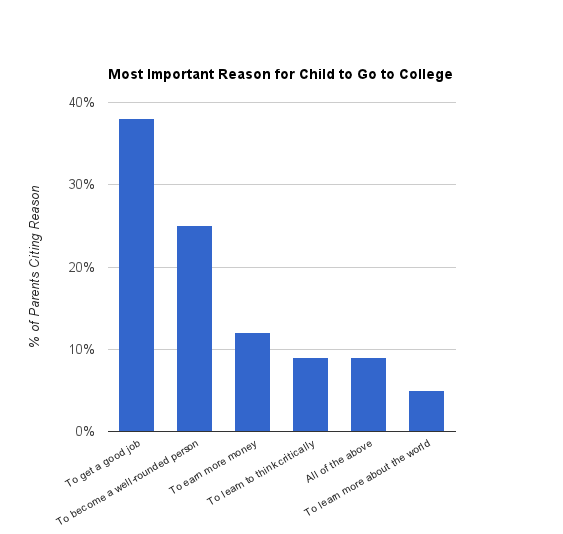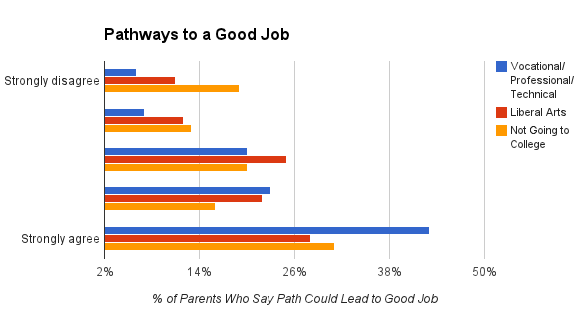Free Download

Study hard, and you'll get into the college of your dreams.
It's debatable whether that advice -- given to generations of American children -- was ever really true. But the first Inside Higher Ed poll of parents of pre-college students suggests that the truer statement today might be "study hard and you can get into the college we can afford," or perhaps "study hard, and we'll help you get into a college that can find you a job."
About the Survey
The new Survey of Parents was conducted by Inside Higher Ed in conjunction with researchers from Gallup. Inside Higher Ed regularly surveys key higher ed professionals on a range of topics; this is the first survey by Inside Higher Ed of people outside higher education.
Gallup conducted the polling during its nightly polls of Americans in September and October 2012, and interviewed 3,269 adults with at least one child in 5th through 12th grades. People whose primary language is Spanish were interviewed in that language.
On Thursday, April 11, Inside Higher Ed presented a free webinar to discuss the results of the survey. Editor Scott Jaschik and two admissions directors -- Jim Rawlins of Colorado State University and
Debra Shaver of Smith College -- shared and analyzed the findings and took audience questions. To view the webinar, please click here.
The Inside Higher Ed survey of presidents was made possible in part by the generous support of McGraw-Hill Education, TIAA-CREF and Zinch, a Chegg service.
Only about 16 percent of parents are sure they won't restrict colleges to which their children will apply because of concerns about costs (although another 14 percent said that it was "not very likely" that they would do so), the results show. Parents are also likelier to see vocational certificates than liberal arts degrees as leading to good jobs for their children -- and they view job preparation as the top role for higher education.
And at a time that a case before the Supreme Court could limit the way colleges use affirmative action, the poll found that most parents (including most white parents) do not believe that affirmative action is costing their children spots in college.
Parental concerns about paying for college and the importance of college programs that prepare students for jobs appear to grow as children get closer to college age, the poll found.
The poll was conducted for Inside Higher Ed by Gallup as part of the polling organization's nightly poll of Americans on a range of subjects. These results are based on responses from 3,269 adults with children in the 5th through 12th grades. According to Gallup, the sample size yields a 95 percent confidence that the results are accurate within two percentage points. Margin of error may be larger for subgroups of the total.
A booklet with all of the survey data, plus related articles from Inside Higher Ed, may be downloaded here.
Sticker Price Still Matters
For decades now, a consistent message from college and university leaders has been that potential students should not be scared off by sticker price, and should be open to applying to even the most expensive of colleges (judged by the rates for tuition and other expenses), knowing that so many colleges offer generous financial aid. To judge from the survey results, this message is not getting through in a consistent way to parents.
Two-thirds of parents say they are very likely or somewhat likely to restrict the colleges to which their children apply -- meaning that these future students may never know of the potential of financial aid to reduce the payments expected of them and of their families. And the likelihood of parents restricting colleges to which their children can apply goes up as the students get closer to college age.
Will Parents Restrict Colleges to Which Children Can Apply, Based on Tuition?
| Response | Child in 5th-8th Grade | Child in 9th-12th Grade | All |
| Not at all likely | 17% | 16% | 16% |
| Not very likely | 17% | 13% | 14% |
| Somewhat likely | 31% | 36% | 34% |
| Very likely | 33% | 34% | 34% |
Richard Ekman, president of the Council of Independent Colleges, said that the results should be "a wake-up call" to college leaders. Despite all the talk about the variety of ways that exist to pay for college, most parents remain unaware that tuition sticker price is not the only important number.
"We have to get people past this affordability mental block," he said. He said that there is a "tremendous amount of aid" being offered by colleges where the sticker price has very little relationship to what most students pay. Somehow colleges have failed to make people understand this, and parents are a crucial audience to reach, he said.
"I think that too many of us in higher education may assume that certain things are understood," he said. "They aren't."
Ekman said cost concerns relate to several economic issues. "Emphasis on jobs and on affordability has been building for a very long time," he said. "What's new is the tremendous acceleration of the emphasis of jobs at the same time there is a tremendous emphasis on affordability. And this is a direct consequence of the economic meltdown."
While this survey is new, and doesn't have past years for comparison purposes, it is clear that jobs are very much on the minds of parents.
Parents were asked to identify the most important reason for their child to go to college and the top answer by far (at 38 percent) was "to get a good job." The third most common answer (at 12 percent) was "to make money," while answers associated with more educational reasons lagged. Parents were given an option of "all of the above," but relatively few took that option.
Breaking apart the data into those whose children are closest to going to college suggests that parental anxiety over jobs grows during those years. Consider the shifts in the top two answers. Of parents of children in 5th-8th grade, 35 percent said "to get a good job" was the top reason to go to college. But the figure rose to 41 percent for parents of 9th-12th graders. And the percentage saying that "to become a well-rounded person" as the top reason fell from 27 percent to 24 percent.
Potentially alarming to colleges is that many parents do not believe that going to college is a necessary step to getting a good job -- notwithstanding what President Obama and many educators would say, citing plenty of data to back up their points. In recent years a growing number of pundits and politicians have questioned the idea that everyone benefits from college -- and the Inside Higher Ed poll results suggest that some parents (a significant minority) agree with this critique.
Parents were asked to respond to the statement: "I am confident that there are ways other than going to college that could lead my child to a good job." On a five-point scale, where 5 was "strongly agree," 31 percent answered 5, and another 16 percent answered 4. Only 19 percent strongly disagreed.
Parents were also asked whether they believed a liberal arts education or a vocational/technical/professional program would lead to a good job. The results show that parents are more likely to strongly believe that no college at all can lead to a good job than to believe that a liberal arts education can lead to a good job.

For many education leaders who promote the idea of liberal education (and who don't see that as inconsistent with preparing for careers), some of the responses are frustrating.
Carol Geary Schneider, president of the Association of American Colleges and Universities, said that she viewed "all of the above" as the "correct answer" on the purpose of college. But she said that the results reflected the reality that many people believe in a dichotomy between education that prepares one for a job and education that encourages critical thinking and other valuable qualities.
In particular, she said that there is a problem for liberal arts colleges and disciplines in that there is a "very confused and ill-informed understanding of what one means by the liberal arts" in the public at large. The AAC&U has conducted a series of surveys of employers on what they look for in college graduates, and has a new survey coming out next month.
Those results, she said, will mirror past surveys in showing that employers are very concerned about whether new hires are critical thinkers, understand the world, know how to solve problems and work with others, and so forth.
A majority of employers surveyed think that these qualities are "more important" than the major, she said. But much of the current discussion about careers suggests that all that matters is picking a job-specific field of study. "Too many people think that the major is all that matters, and everything else is irrelevant.... What employers are really looking for is that they want to know that students can apply their learning to new settings and to complex problems," and that can be true of any number of majors.
Ekman of the Council of Independent Colleges agree that part of the problem is that the public doesn't really know what a liberal arts college is any more -- and that liberal arts colleges describe themselves in different ways. "There are very few so-called pure liberal arts colleges," he said. "Almost every college that calls itself a liberal arts college offers a few professional programs, and general education, and that's a very good model."
Schneider, however, also faulted politicians, the news media, and academic leaders for seeming to accept the idea that narrow education with a job focus is the best kind. "I think policy leaders and public officials who should know better are contributing to the public perception," she said. "The ill-advised rush from the Obama administration and state capitals to track the return on investment of a particular major is simply reinforcing outdated thinking."
Not only will people be better off over their lifetimes with a broader education, but so will the country, she said. "The academy needs to be more courageous that there is a fundamental connection between liberal education and future of democracy," she said.
Faculty Survey: Students Aren't Becoming More Professional
While parents are worried about their children picking up job-related training, faculty members are worried that students aren't showing greater levels of professionalism. A survey released Tuesday by York College of Pennsylvania -- based on 400 faculty members nationwide -- found that only 12.3 percent of professors believe students have become more professional in the last five years, while 50.2 percent believe students have maintained the same level of professionalism, and 37.5 percent have seen a decrease in professionalism.
The main complaints of unprofessional behavior? Inappropriate use of technology and inability to focus.
Others, however, say that colleges can do much more to help students prepare for jobs.
Wake Forest University has greatly expanded career counseling offered to all students, with formal courses, more advisers, and a constant flow of information on career paths. Parents have started to donate money for career services, and other colleges send teams to study the Wake model.
Andy Chan, vice president for personal and career development at Wake Forest, said that the emphasis parents are placing on jobs shouldn't surprise or necessarily alarm anyone. "I think it's indicative of what's happening in the general market place and the anxiety families feel," he said. "When I think about it, if colleges really invest in personal and career development, and show the connection and the actual outcomes of what getting a liberal arts education can result in, and show that there's a lot of support, then parents will feel better about investing in a liberal arts education."
Chan said, however, that too many colleges and too many programs don't provide the services or the information that will reassure parents. Wake recently started publishing person-by-person job titles for academic majors. The names are not given, but the year of graduation is, along with the city. For art history, for example, one would find that recent graduates are employed as a "tasting room associate" in a winery in Napa; an English teacher; a curatorial assistant; and so forth. Many are in graduate school (with institutions named); one is an au pair. "When you gather the information, there is a lot of good news, but most places aren't telling the story," he said.
Loans? Don't Be Sure You Can Count on Mom and Dad
While parents are very worried about their children getting good jobs, only some are willing to borrow money themselves to pay for their children's higher education. Inside Higher Ed asked the parents how much debt they would be willing to accumulate for a four-year degree for a child. Some are willing to take on quite a lot of debt -- with 21 percent saying that they would consider borrowing $50,000 or more. But nearly as many (20 percent) said that they were unwilling to take on any debt, and another 7 percent would not consider debt greater than $10,000.
For this question, there appears to be a relationship between parent reactions and parent income. Of those who earn at least $7,500 a month ($90,000 a year), 31 percent would be willing to borrow $50,000 or more. Of those with family income up to $3,000 a month, only 11 percent would be willing to take on that level of debt.
But those earning $7,500 a month or more were also more likely than those earning up to $3,000 to say that they would take on no debt for their child's education (21 percent to 19 percent).
Affirmative Action: Who Loses?
Inside Higher Ed surveyed parents at a time of growing public debate over affirmative action in higher education. The Supreme Court has heard arguments but has yet to issue a ruling in challenge to the consideration of race in admissions by the University of Texas at Austin. While the case could be decided narrowly about the policies at Texas, it also could (if those suing have their way) lead to limits or a ban on consideration of race in higher education admissions. The case was filed in the name of Abigail Fisher, a white woman whose lawyers say that she would have been admitted to UT-Austin but for its consideration of race. Critics of affirmative action talk regularly about Fisher and people like her, suggesting that individuals are being excluded from elite colleges for not being a member of a minority group. (Of course, the evidence of the impact of affirmative action on any one individual isn't easy to determine and many argue that Fisher wouldn't have gotten into Texas even without programs that consider race.)
Given the political significance of the debate, Inside Higher Ed asked parents whether they believed that affirmative action hurt their children's chances of admission to college. Only a minority of American parents (and only a minority of white parents) believe that this is the case. (A key caveat: Gallup officials did not consider that their sampling of Asian-American parents was large enough to draw conclusions about their views, and Asian-American groups have been split on affirmative action.)
The results below show that there are minorities of black and Latino parents who believe that their children's chances of admission are hurt by affirmative action. But black parents were far more likely than other parents to strongly disagree with the statement that their children's chances of admission were hurt. The results suggest parents may be aware of one of the points made by defenders of affirmative action: that most students get into the colleges they apply to, and that there are only a small proportion of colleges with highly competitive admissions for anyone.
Parents on Whether Affirmative Action Hurts Their Children's Chances of Admission
| View | All | White | Black | Hispanic |
| 1 (strongly disagree) | 27% | 23% | 53% | 26% |
| 2 | 15% | 17% | 9% | 15% |
| 3 | 23% | 24% | 15% | 25% |
| 4 | 13% | 13% | 7% | 16% |
| 5 (strongly agree) | 20% | 23% | 16% | 18% |
Doug Lederman contributed to this article.